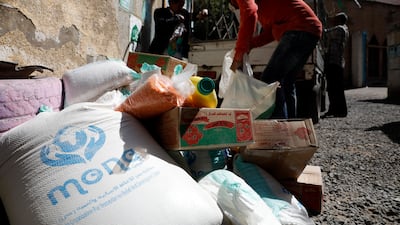Concern is growing among aid groups operating in Yemen that the global financial downturn caused by the coronavirus pandemic and the Russia-Ukraine war could severely affect their work.
NGOs may be forced to scale down operations, despite millions of Yemenis remaining in dire need of humanitarian assistance, a senior relief official said.
Martin Schuepp, director of operations for the International Committee of the Red Cross , told The National that aid organisations cannot afford to reduce operations.
“Although we are facing a challenging global economic crisis [that includes] inflation and disruption of supply chains, it’s important for us to maintain vital operations in Yemen," he said.
Yemen is facing one of the world’s worst humanitarian crises and assistance is vital.
"The country unfortunately continues to present one of the worst humanitarian crises in which we operate,” Mr Schuepp said.
The war has left nearly 23.4 million Yemenis — more than 70 per cent of the population — in need of humanitarian assistance in 2022, according to various aid organisations including the ICRC and the UN. More than 12 million people are estimated to be in acute need.
The figures also show that 19 million people are food insecure, of which 7.1 million people are projected to face emergency conditions.
Nearly 17.8 million lack access to safe water and adequate sanitation services.
“Millions of Yemenis lack access to water and health care and are food insecure," Mr Schuepp said. "We can’t reduce our ambition. We plan to maintain a large operation about the same level this year and for next year. It’s important we are able to uphold this level of operations moving forward.
Mr Schuepp has just completed a visit to Yemen, where relief response remains underfunded, leaving many donor groups with limited resources.
"If we face significant shortfalls of funding, it will require us to reduce our operations and to help fewer Yemenis, while we see more Yemenis who are food insecure who require access to healthcare and water," he said.
The ICRC's Yemen budget in 2021 was about $112 million. In 2022, it is about $134 million.
With that budget, the organisation has been able to "provide signification assistance to populations affected by the conflict, support hospitals, work on water supplies and work on long-term measures that will provide long term relief to the population," Mr Schuepp said.
The ICRC official said that while Yemenis are divided on the front lines, they are united in one thing — that there is "too much suffering today".
Mr Schuepp said the only way to end the suffering was through a political solution that all sides to the conflict agreed to.
"What is clear is that if we want recovery and respite for the Yemeni people, it will require a political solution," he said.
Yemen's political process will be important in allowing people to rebuild their lives more sustainably, he said.
"This is not where the ICRC is active, that's in the political arena," he said.
A UN-brokered nationwide ceasefire that went into effect on April 2 brought about six months of relative calm after being extended twice for two-months periods.
However, Yemen's warring sides failed to agree on a further extension beyond October 2.


